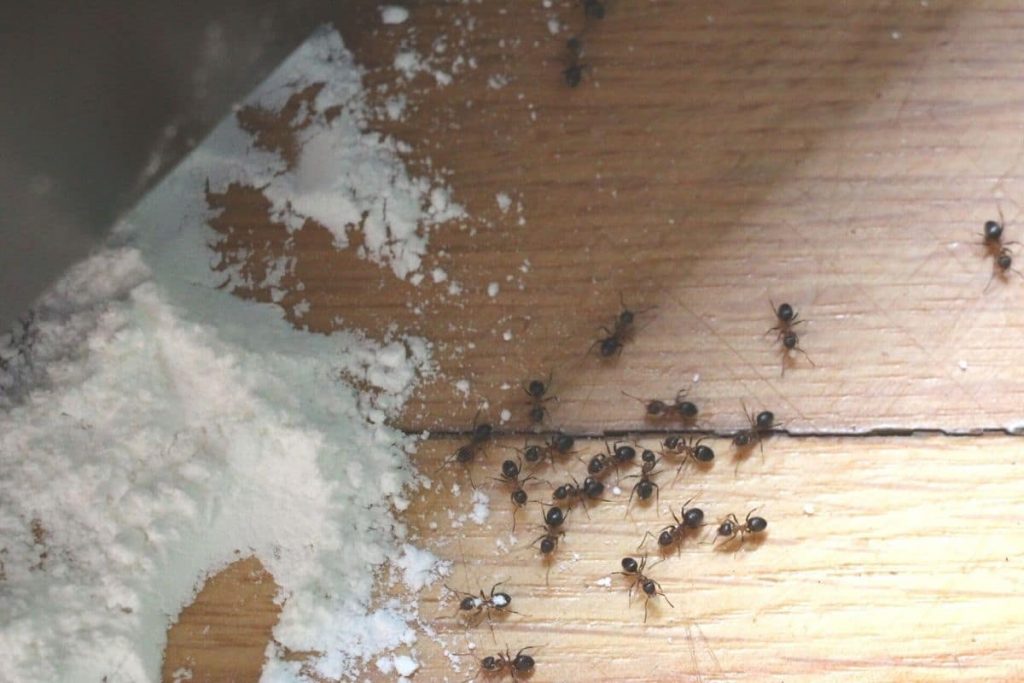Ants are undoubtedly useful, but again and again uninvited guests. To protect the environment, a wide variety of home remedies are used to combat them. We have taken a look at what sodium bicarbonate can do against ants.
To the point
- Ants can be fought with home remedies
- Sodium bicarbonate kills ants effectively
- Effect is based on a disturbance of the acid-base balance and the development of carbon dioxide
- Feeding bait necessary, as ants recognize and avoid the poison
Contents
What is sodium bicarbonate?
From the chemist’s point of view, this substance is sodium hydrogen carbonate with the chemical formula NaHCO3. The trivial name is known mainly from the household, where the substance is used in a variety of forms. It is probably best known as the main ingredient of classic baking powder, where its gas-forming effect is important. Under the influence of water, sodium hydrogen carbonate reacts, among other things, to form carbon dioxide, better known as CO2.
How baking soda works against ants
Leaving its use as a baking soda and looking at the way NaHCO3 can help control ant colonies, two modes of action of the substance come into focus:
CO2 formation: As in cooking, the substance reacts with the moisture inside the ant after consumption to produce CO2. The stomach of the animals is extremely stressed in the process. Damage to the internal organs is one of the possible causes of death.
Acid-base balance: For proper function, the ant’s stomach depends on a very fragile chemical balance in a very narrow pH range.

Sodium bicarbonate changes the pH so rapidly and extremely that the body functions of the animals are disturbed. Again, death follows in most cases.
Note: Again and again one reads about the ant “exploding” after the consumption of sodium bicarbonate. Although the animals do not burst perceptibly, the destruction of the digestive tract that occurs does correspond to the effect described.
Use sodium bicarbonate correctly
In order for the home remedy to actually achieve the desired effect against ants, you should know how to use it correctly:
- Mix sodium bicarbonate with sugar, powdered sugar or other food attractant.
- place bait on observed ant trails and on the nest itself (if known)
- only small amounts at a time to avoid danger to pets from relevant consumption quantities
- Replace bait after rain, dew and other dampness
- Observe changes in the population and, if necessary, add to or relocate bait sites
Tip: Use only dry substances as attractants. Moist attractants, such as honey, cause CO2 to form even before they are consumed. A large part of the effectiveness is thus wasted.
Frequently asked questions
Why does the baking soda used not show any effect?
It is possible to use baking soda against ants instead of pure natron without any problems. The corn starch contained in the powder does not affect its effectiveness. If the powder does not work, you have probably chosen the wrong baking powder without sodium hydrogen carbonate as a propellant. Other leavening agents also produce the gases needed for baking, but they are ineffective against ant colonies.
Why does the ant trail not dry up despite?
If you only reach the ants’ walking paths, it may take a very long time for the bait not only to be consumed on site, but also to be transported to the home nest. Only when you apply sodium bicarbonate directly at the nest can you assume a sufficiently high input into the breeding site that the colony as a whole is decimated or completely eliminated.
Are there alternatives to sodium bicarbonate against ant colonies?
If you use baking soda or pure sodium bicarbonate against ants, be prepared for a long death struggle of the animals. Sometimes chemical baits achieve faster results and shorter suffering due to the toxins they contain. However, you are introducing poison into the house or garden, which can also be effective on other life forms.

